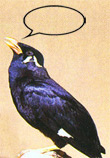| ||||||||
|
|
Why
Not(e)?
You don't notice my shortcomings when we have casual conversations. I easily manage interactions over a counter, or at the grocery store. If you bring up theatre or politics or relationships, I will be able to follow you, and might even be able to add to the conversation. But if you bring up a subject that I know nothing about, my stutter will become more noticeable. My grasping for language will become increasingly louder and more gauche. I get confused, but instead of going mute, I belly-flop in words. And if you are wielding hardly-used terms or multi-syllabic expressions, I will parrot them back at you, awkwardly and persistently, until I roll the new words around my tongue like a just-prepared piece of sushi. Do you mind if I ask you something? Why do you say, "a needle in the haystack?" Who would put something so tiny and insignificant inside of a high pile of dried grass? And then who would look for something so minute, so easily replaced, if they had? I recently bought a book about the origins of English idioms because the more I know the stories of the sayings, the more I can make the phrasing stick. It's not that American English is the exception to the world's rules -- in every language I have learned, there are a number of colloquialisms that don't make perfect, literal sense. I find mon petit chou an odd term of endearment, because my experiences with cabbage have left me much less endeared than gassy. I am writing a book in English, even while I am teaching the language to myself, idioms and all. Every page is a lesson, transcribing a melody that becomes more and more hum-mable. It's an ambitious project, but I learn by doing, so why not? I will readily admit that when I write, I often interchange words that sound similar but have drastically different meanings. I write "call" instead of "car," "sore" instead of "soul." I find the mistakes when I edit, and the first-draft faux-paux are often funny and sometimes enlightening in context -- like writing "Why note?" on the top of an essay I had intended to call "Why not?" I graduated from speech therapy four months ago, but my therapist still meets me for coffee periodically to check in. Recently, at a sidewalk café, she sat across from me and wanted to know about my progress. I told her about the book I'm writing, and asked her if she had thought that I would come this far, this quickly. It was an honest inquiry, but I am pretty sure that you would call this "fishing." My speech therapist doesn't mind. "No," she said, as she stirred a second raw sugar packet into her cappuccino, her broad smile assuringly toothy. "You were motivated Lauren and that counts, but a lot of people who have had your type of brain damage never recover." I childishly beamed with her praise and enjoyed when she added that I had made a "really remarkable recovery." I loved her alliteration. It was August of last year, two months after my 27th birthday, when I went on tour with a show from New York to the International Fringe Festival in Scotland. On a night off, some close friends and I went into a dingy dive bar in Edinburgh, and decided to try to win the prize money for the best karaoke performance of the night. When we were called to the stage, my friend and I began to sing the song that she had selected as our "sure-fire" submission to the competition, a duet of Total Eclipse of the Heart. I don't remember stopping the song, I don't remember the fall.
continued...
|










 You
know me, I'm the person in your car who, when a song comes on the
radio, sings loudly and excitedly, but sludges though 80% of the
words. It's annoying, I know. But I am not a native speaker and
I've been learning this language by melody -- the broad strokes
come first, the nuances take time.
You
know me, I'm the person in your car who, when a song comes on the
radio, sings loudly and excitedly, but sludges though 80% of the
words. It's annoying, I know. But I am not a native speaker and
I've been learning this language by melody -- the broad strokes
come first, the nuances take time.